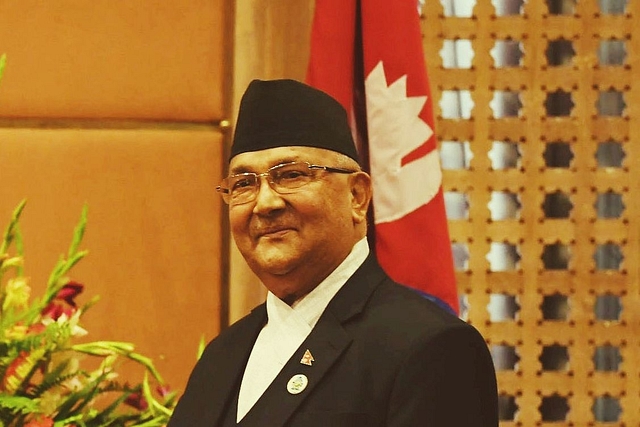
Nepal PM’s ‘Ram Was Nepali’ Claim Triggers Outrage, But This Is Why He Needn’t Be Taken Seriously
Oli has the well-earned reputation of being a gadfly who often puts his foot in his mouth and comes up with ridiculous statements and proclamations.
And of late, faced with a serious challenge to his Prime Ministership from within his party, Oli’s propensity to spew inanities and absurdities have only increased.
Nepal’s embattled Prime Minister, Khadga Prasad Sharma Oli, has triggered outrage in India with his baseless claim that Bhagwan Ram was a Nepali and Ayodhya is a village west of Birgunj in the Himalayan nation.
Oli has since been pilloried by people ranging from the priests of Ayodhya who called him insane and Congress leader Abhishek Manu Singhvi who said Oli has lost his mental balance, to other politicians, historians and netizens.
A feeling of outrage has swept through India, more so since the remark came a few weeks after Oli’s cartographic assertion (including areas within India in Nepal’s new map).
Even Nepal’s senior politicians and prominent civil society leaders have contested and criticised his claim.
Rastriya Prajatantra Party chairman and former Deputy Prime Minister, Kamal Thapa, was one of the first to strongly condemn Oli for his claim.
Indians, on their part, need not be angered by Oli’s remarks. Indians also need not take him seriously, because even his own countrymen don’t.
Oli is infamous within his own country for making unintelligent and hilarious remarks that often become the butt of jokes.
He has, quite often, been an object of ridicule and jest in Nepal.
Oli has the well-earned reputation of being a gadfly who often puts his foot in his mouth and comes up with ridiculous statements and proclamations. And of late, faced with a serious challenge to his Prime Ministership from within his party, Oli’s propensity to spew inanities and absurdities have only increased.
Take his statements on the coronavirus. In end-May, Oli said Nepalis would beat the virus with their strong will power and immunity.
Two weeks later, in an address to the National Assembly, Oli said: “Corona is like the flu. If contracted, one should sneeze, drink hot water and drive the virus away”.
Video clips of his address soon went viral and earned him ridicule and condemnation for trivialising the pandemic and spreading disinformation.
Prasiddhi Shrestha, Nepal’s second Covid-19 survivor, immediately tweeted a strong rebuttal.
The rebuttal got widespread approval by social media users in Nepal.
Oli had also told the National Assembly that a positive state of mind, and deep breathing exercises like pranayam would also make a person immune to the virus.
A few days before this, Oli told Parliament that since a majority of Nepalis breathe fresh air and have a lot of ginger, garlic and turmeric as part of their diet, they should not be worried about the coronavirus.
Sameer Mani Dixit, research director at the Centre for Molecular Dynamics, Nepal, who was invited by Oli to an expert panel to discuss Covid-19 related issues, is reported by The Kathmandu Post to have commented: “Oli does not understand Covid-19. He has to internalise the fact that it is a disease, not politics”.
Nepali Congress parliamentarian Gagan Thapa, who had questioned Oli on his claim that Nepalis have stronger immunity on the floor of the parliament, remarked in jest: “Oli does not know many things, but he does not know that he does not know. He is arrogant and delusional”.
Former Prime Minister and leader of the Janata Samajbadi Party, Baburam Bhattarai, said Oli seems to be suffering from the Dunning-Kruger effect, a cognitive bias of illusory superiority that stems from the inability of some people to recognise their own inabilities.
Bhattarai also said that Oli is delusional and he (Oli) feels his inanities will see him through.
This telling report in The Kathmandu Post titled ‘When Oli Speaks Before Parliament, There Is No Telling What He Will Say’ details Oli rambling on for hours, veering off the topic and side-stepping serious issues.
Oli also remarked in the midst of the pandemic that the Indian coronavirus looks more lethal than the Chinese or Italian.
That statement earned him a lot of condemnation from experts who rubbished his claim.
A couple of weeks ago, Oli told the National Assembly: “Depression has various symptoms and one of them is that suicidal thoughts occupy the mind. Some people kill themselves. But a normal person cannot commit suicide. If a person is normal or they have not gone into depression, life is dear to them.”
That left mental health experts stunned.
Another statement of his before Parliament that attracted contempt was: “People with certain conditions should not consume turmeric. If you have anemia, you should avoid turmeric. If you are suffering from jaundice, you should not take turmeric. Likewise, expecting and nursing mothers should avoid turmeric. If you have iron or blood deficiency, you should shun turmeric. There are many situations in which turmeric should not be taken. People scheduled for surgery should avoid turmeric for 48 hours or 72 hours or 2-4 days before the surgery because turmeric thins the blood”.
Medical experts were left aghast at this remark and many took to social media to debunk Oli’s false claims.
But Oli is unfazed.
Bhattarai, who knows Oli personally, says that Oli thinks his bluster and lies will see him through.
“He thinks everyone is foolish and will believe his false statements and ridiculous claims. He doesn’t realise that he has reduced himself to a jester who is now the butt of jokes and derision in Nepal,” said Bhattarai.
If Nepal’s senior politicians and its masses feel this way about Oli, there is no reason why Indians should feel outraged by the Nepal Prime Minister’s unintelligent and baseless ramblings, raves and rants.